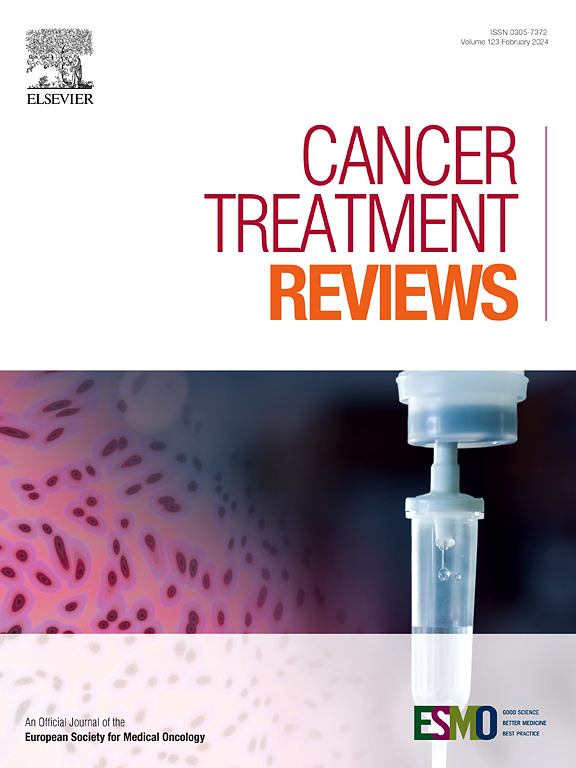Impact of loss of HER2 positivity following neoadjuvant therapy in HER2-positive breast cancer patients on long-term prognosis: A systematic review and meta-analysis
IF 9.6
1区 医学
Q1 ONCOLOGY
引用次数: 0
Abstract
Aims
The primary objective was to assess the impact of HER2 loss after neoadjuvant therapy on the long-term prognosis of patients with HER2-positive breast cancer.
Methods
We extracted relevant studies from PubMed and Cochrane Library and performed systematic review and meta-analysis. The key eligibility criteria for the studies were as follows: included HER2-positive early breast cancer cases undergoing neoadjuvant therapy, available data on HER2 status before and after neoadjuvant therapy, and reported recurrence-related outcomes (disease-free survival/invasive disease-free survival/relapse-free survival) or overall survival.
Results
Of 915 studies that were initially identified, 8 met the eligibility criteria and were included in the meta-analysis for the recurrence-related outcomes (1,917 patients with HER2 loss: 411 [21.4 %] or HER2 retained: 1,506 [78.6 %]); 4 of them reported data on overall survival (606 patients with HER2 loss: 243 [40.1 %] or HER2 retained: 363 [59.9 %]). The average follow-up duration, based on data from five out of eight studies that reported this information, was 51.6 months. HER2 loss was significantly associated with worse recurrence-related outcomes (hazards ratio [HR] 1.85, 95 % confidence interval [CI] 1.31–2.61, p = 0.0005) and worse overall survival (HR 2.37, 95 % CI 1.27–4.41, p = 0.0065). No heterogeneity or publication bias was observed in the meta-analysis.
Conclusions
This study demonstrated that compared with patients with HER2 retained, those with HER2 loss had significantly higher risk of disease recurrence and worse prognosis. These findings implied the possible use of HER2 loss as a prognostic factor in patients with HER2-positive early breast cancer. Reassessment of HER2 status after neoadjuvant therapy could be valuable in predicting prognosis and may lead to reconsideration of the rational subsequent treatment.
HER2阳性乳腺癌患者新辅助治疗后HER2阳性丧失对长期预后的影响:一项系统回顾和荟萃分析
目的:主要目的是评估新辅助治疗后HER2丢失对HER2阳性乳腺癌患者长期预后的影响:我们从 PubMed 和 Cochrane 图书馆中提取了相关研究,并进行了系统回顾和荟萃分析。研究的主要资格标准如下:纳入接受新辅助治疗的 HER2 阳性早期乳腺癌病例,提供新辅助治疗前后的 HER2 状态数据,报告复发相关结果(无病生存期/无侵袭性疾病生存期/无复发生存期)或总生存期:411例[21.4%]或HER2保留:其中 4 项报告了总生存期数据(606 例 HER2 缺失患者:243 例 [40.1 %] 或 HER2 保留患者:363 例 [59.9 %])。八项研究中有五项报告了相关数据,平均随访时间为 51.6 个月。HER2缺失与较差的复发相关结果(危险比[HR] 1.85,95% 置信区间[CI] 1.31-2.61,p = 0.0005)和较差的总生存期(HR 2.37,95% 置信区间[CI] 1.27-4.41,p = 0.0065)明显相关。荟萃分析未发现异质性或发表偏倚:这项研究表明,与保留HER2的患者相比,HER2缺失的患者疾病复发风险更高,预后更差。这些发现意味着,HER2缺失可能成为HER2阳性早期乳腺癌患者的一个预后因素。在新辅助治疗后重新评估HER2状态可能对预测预后很有价值,并可能导致重新考虑合理的后续治疗。
本文章由计算机程序翻译,如有差异,请以英文原文为准。
求助全文
约1分钟内获得全文
求助全文
来源期刊

Cancer treatment reviews
医学-肿瘤学
CiteScore
21.40
自引率
0.80%
发文量
109
审稿时长
13 days
期刊介绍:
Cancer Treatment Reviews
Journal Overview:
International journal focused on developments in cancer treatment research
Publishes state-of-the-art, authoritative reviews to keep clinicians and researchers informed
Regular Sections in Each Issue:
Comments on Controversy
Tumor Reviews
Anti-tumor Treatments
New Drugs
Complications of Treatment
General and Supportive Care
Laboratory/Clinic Interface
Submission and Editorial System:
Online submission and editorial system for Cancer Treatment Reviews
 求助内容:
求助内容: 应助结果提醒方式:
应助结果提醒方式:


